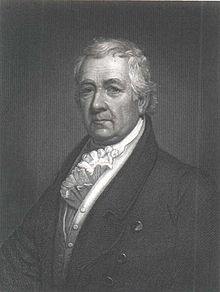Background
He was born in Hempstead, New York.


naturalist physician politician
He was born in Hempstead, New York.
In 1786 he graduated from the University of Edinburgh, an education paid for by a wealthy uncle.
At Columbia Mitchill lectured on botany, zoology, and mineralogy, and he collected, identified, and classified many plants and animals, particularly aquatic organisms. He also gave mineral collection to Columbia museum for use of future teachers.
While at Columbia, Mitchill developed a fallacious theory of disease, which however resulted in his promotion of personal hygiene and better sanitation.
Mitchill helped to organize the short-lived Rutgers Medical College of New Jersey, which he served as vice president until 1830.
Mitchill strongly endorsed the building of the Erie Canal, sponsored by his friend and political ally DeWitt Clinton; they were both members of the short-lived New-York Institution.
Mitchill suggested renaming the United States of America Fredonia, combining the English "freedom" with a Latinate ending. Although the suggestion was not seriously considered, some towns adopted the name, including Fredonia, New York.
His most notable contributions include papers on the fishes of New York, the origin of Indians, Indian poetry, Indian antiquities.
Author of Explanation of the Synopsis of Chemical Nomenclature and Arrangement, 1801
The Medical Repository
Member of New York Legislature 1798, 1798, 1810;
Member of the US House of Representatives from New York (DEMOCRAT), 7th, 9th, 12th congresses in 1801- 1803, 1805- 1807 and 1811- 1813;
Member of US Senate (DEMOCRAT) from New York in 1804- 1809.
Member New York Legislature, 1791, 98, 1810. Member United States House of Representatives from New York (Democrat), 7th, 9th, 12th congresses, 1801-1803, 05-07, 11-13. Member United States Senate (Democrat) from New York, 1804-1809.
Married Catherine Akerly, June 23, 1799.
